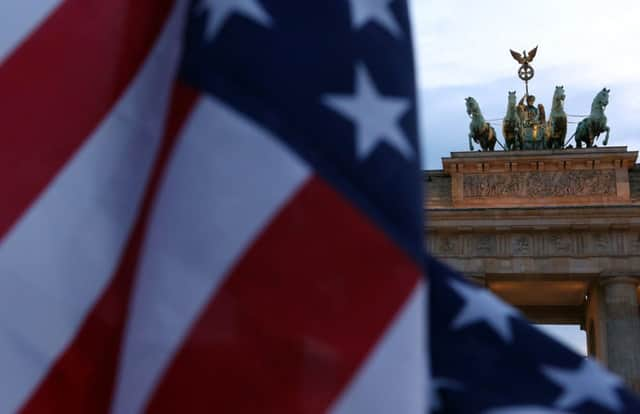CIA station chief to leave Germany over spy claims


The scandal has plunged ties between Germany and one of its closest allies to a new low following last year’s revelations from former Central Intelligence Agency (CIA) and National Security Agency (NSA) contractor Edward Snowden about widespread surveillance of Germans, including Mrs Merkel, whose phone was tapped.
“The request was made in light of the ongoing investigation by the chief federal prosecutor and questions that have been raised for months about the activities of us intelligence services in Germany,” Mrs Merkel’s spokesman Steffen Seibert said.
Advertisement
Hide AdAdvertisement
Hide AdOn Wednesday, Berlin said it had discovered a suspected US spy in its defence ministry just days after a German foreign intelligence worker was arrested on suspicion of being a CIA informant and admitted passing documents to a US contact.
Mrs Merkel delivered her strongest words yet on the alleged espionage, which she said belonged to the Cold War era.
“Spying on allies is a waste of energy. We have so many problems, we should focus on the important things,” she told reporters. “In the Cold War maybe there was general mistrust. Today we are living in the 21st century. Today there are completely new threats.”
Mrs Merkel has come under pressure to take action against the US, given public anger about the spying allegations in a country which suffered the oppressive activities of the Nazi Gestapo and East German Stasi.
Mr Seibert said it was essential for Germany to work with its western partners, especially the US, but that required “mutual trust and openness”.
Interior minister Thomas de Maiziere said the information that the US appeared to have obtained was “laughable”, contrasting that with the “disproportionate and serious political damage” that the scandal had caused.
There was a broad consensus from other political parties.
Burkhard Lischka of the Social Democratic Party, which is in coalition with Mrs Merkel’s conservatives, said: “For over a year we have been asking questions and failed to get a response.” As a result, he said, “cracks” had started to appear in Germany’s relationship with the US and president Barack Obama.
Andre Hahn, a Left party member on the supervisory panel, said that the recent spying cases had shown that “we wouldn’t put anything past Russia and China. But there’s blind trust in the US. This trust has now taken a knock.”
Advertisement
Hide AdAdvertisement
Hide AdIn Washington, National Security Council spokeswoman Caitlin Hayden declined to comment on “a purported intelligence matter”.
“Our security and intelligence relationship with Germany is a very important one and it keeps Germans and Americans safe,” she said. “It is essential co-operation continue and we will continue to be in touch with Berlin in appropriate channels.”